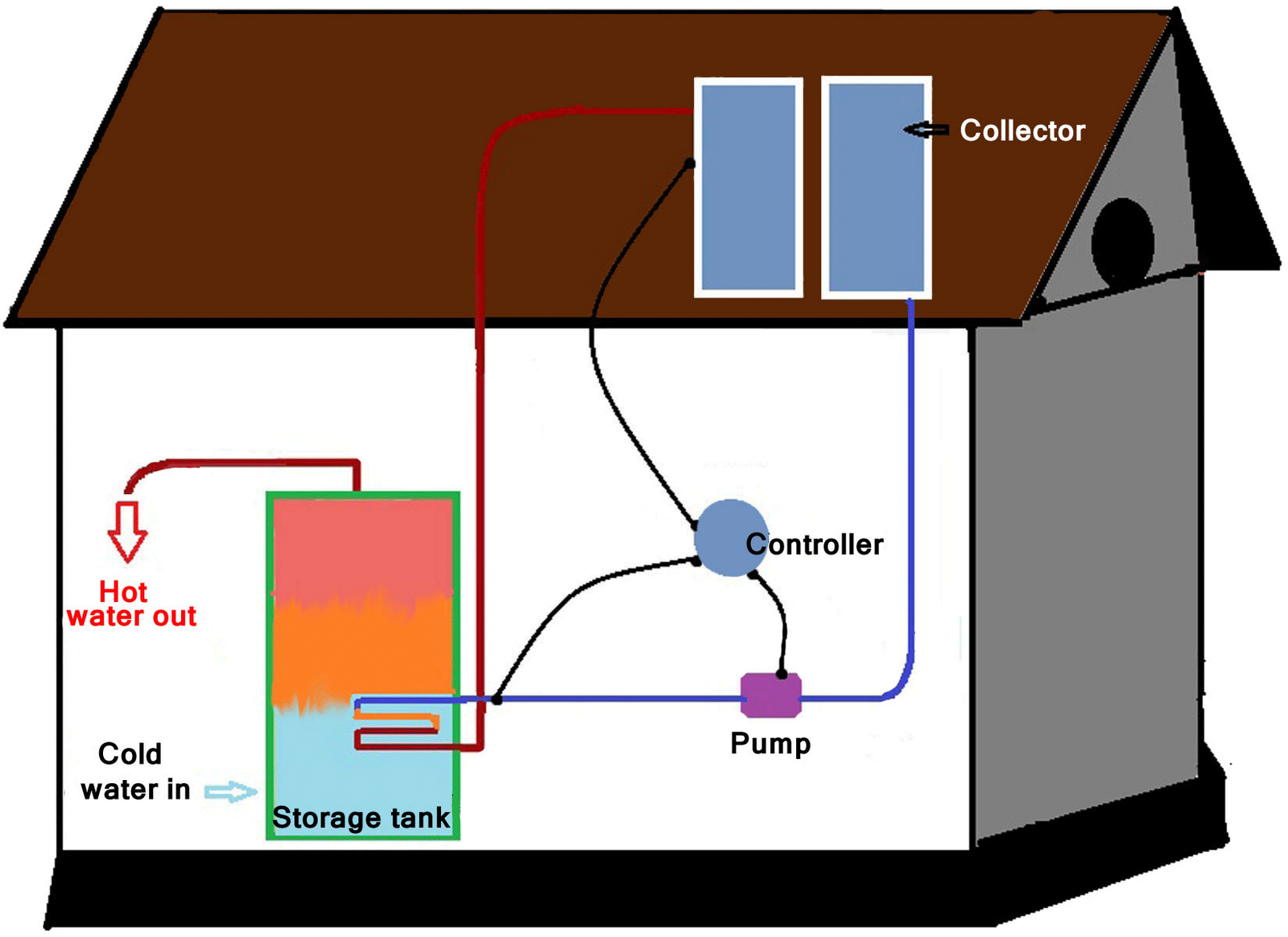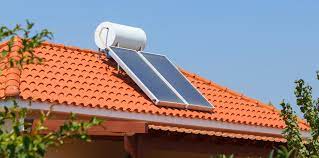Solar Water Heater Calculator | Capacity of Solar Water Heater
Articles, products, and services offered on this site are for informational purposes only. We are part of the Amazon Services LLC Associates Program, an affiliate advertising program. Amazon.com is compensated for sales resulting from links on our website.
Please review our disclaimer before acting based on anything you read or see.
A solar thermal collector converts sunlight into heat for water heating in a solar water heater. Various designs are offered at differing costs for solutions in various climates and latitudes. For many domestic and industrial uses, solar water heaters are employed. A working fluid enters a storage system after being heated by a sun-facing collector for later use. Another crucial tool, in this case, is the solar water heater calculator. Thus, we have made this post to aid you.
Solar water heaters are passive and active (pumped) (convection-driven). They either utilize water alone, water plus a working fluid, or both. Solar water heaters are heated either directly or with the use of light-focusing mirrors.
They may run on their own or in combination with electric or gas heaters. Mirrors may focus sunlight into a smaller collector in large-scale setups.
An individual needs between 30 and 50 liters of water per day for showering. Therefore that is the general guideline used to determine capacity. Additionally, a solar water heater with a 250-liter capacity is excellent, given the typical household size of 3 to 4 people. You will be more helped in this using the solar water heater calculator. Come along as we highlight more on this below.
What is the Solar Water Heater Calculation?

The technique used to assess the energy effectiveness of a solar water heater is the solar water heater calculation. This is also explained as the system’s energy output divided by the electrical or gas input energy. The number increases in energy efficiency as it rises.
Solar Water Heater Calculator
How to Calculate a Solar Water Heater?
It is advisable to calculate the yearly running expenses and compare various systems before investing in a solar water heating system. This will enable you to calculate the energy savings and return on investment of purchasing an energy-efficient system. This will cost more to acquire.
Knowing the system size needed for your house is necessary before you can pick and compare the prices of different systems.
It would help if you had the following to calculate a solar water heating system’s yearly running cost:
The solar energy component of the system (SEF) is the price and fuel type of the auxiliary tank (gas or electric). Current rates are available from your local utility.
Use the formula below then:
365 days x 12.03 kWh/day x (1.0) SEF x ($0.1042) Equals $457.54 for annual water heating costs.
Why Installing Solar Water Heaters is so expensive?
The following factors contribute to the high cost of installing a solar water heater. This has also been elaborated on in the infographics below.

How to Find the Total Installed Capacity of Your Tank & System
You must examine three dimensions to determine the total installed capacity of your tank and system. The length, width, and height make up those three dimensions. Let L stand for length, B for breadth, and H for height. Therefore, LXBXH will be the entire installed capacity of your tank and system.
What is the important Solar-Water-Heater?
The important Solar-Water-Heater includes:

Direct circulation systems: Automatic controllers can detect when sunlight is being captured. It works well in climates with above-freezing temperatures.
Indirect circulation systems: These work in below-freezing conditions. A swimming pool may be heated using solar energy in addition to using it to heat hot water pipes. It costs extra money as well.
Integral collector-storage dampers are best suited for homes with high hot-water demands because of the storage tank. This works well in regions where the temperature doesn’t drop below zero.
Systems using thermosyphons: These are the most dependable. It works for those who have intense hot water demands and is adaptable to locations with sub-zero temperatures. Additionally, it is the costliest one.
Pros & Cons of using a Solar Water Heater
The Pros & Cons of using a Solar Water Heater have been highlighted in the table below.
| Pros | Cons |
| Savings on water heating costs | High installation fees upfront |
| Simple to maintain | On overcast, wet, or foggy days, the system is inoperative. |
| Friendly to the environment | Water is just heated. |
| Minimal upkeep | Roof space must be adequate to allow solar heaters. |
| Extremely effective | For solar water heaters to work, they need direct sunshine. |
| Reduced Carbon Footprint | |
| Boosting home value | |
| Tax advantages |
Solar Hot Water Considerations
Solar hot water systems employ solar thermal energy to warm the water in your house. Some considerations are necessary for these systems. They consist of the following:
Collectors
The “collectors,” or solar thermal device’s panels, are commonly mounted on rooftops.
These collectors differ from the photovoltaic solar panels you’re undoubtedly acquainted with. They also produce heat rather than electricity. Through the glass covering of a collector, sunlight or “solar radiation” enters and hits an absorber plate. It features a covering that will absorb solar energy and turn it into heat. A “transfer fluid” housed in tiny pipes in the plate receives the heat created.
There are many sizes of collectors. Depending on how much sunlight your roof receives and how much hot water you use at household, you’ll decide how big and how many collectors to install. Additionally, they are produced in a flat plate and evacuated tube designs.
A storage tank with a heat exchanger
Your collectors’ transfer fluid travels into a network of pipes known as a “heat exchanger” after it has heated up. This may be found within the hot water storage tank. Heat is transmitted from the pipes to your water when these pipes are filled with heated transfer fluid, creating hot water that is ready for use in your house.
System of controllers
Most solar hot water systems incorporate a control mechanism to prevent overheating the water in the storage tank. Controller systems may also stop cold water from cycling through the system when cold outside and the transmission fluid isn’t warmed enough.
Frequently Asked Questions
How much solar water heater capacity do I need?
For example, if 1000 liters of hot water are needed daily for cooking, the necessary capacity of the solar water heater is 1.5 * 1000 = 1500 LPD.
A solar water heater can heat how much water?
These systems typically have a 40-gallon capacity.
How do you calculate water heater capacity?
Based on the number of occupants in residence, you may determine the required tank capacity (in gallons):
- 23 to 36 gallons for 1 or 2 persons
- 36 to 46 gallons for 2 to 4 persons
- For 3-5 persons, 46–56 gallons are needed.
- 5 persons or more—more than 56 gallons
How long does water stay hot in a solar water heater?
An insulated storage tank holds the hot water the solar heating system generates throughout the day. Due to the tank’s insulation, the water should stay hot for around 24 hours without experiencing a substantial decrease in temperature.
Does solar hot water stay hot overnight?
Yes. Your solar hot water system puts in a lot of effort during the day to heat water that will be warm enough to use during the night and into the following morning.
Do solar water heaters work in cold weather?
Yes, it is the solution. Because of effective insulation, the solar water heater operates well in the winter. Thus, solar water heaters employ radiator fluid technology when winter temperatures are consistently low.
Does the solar water heater work on cloudy days?
On an overcast and rainy days, a solar water heater will continue to provide hot water. It takes more than a few overcasts to screen the sun, as anybody who has been burned on an overcast day will attest. Even if clouds may block part of the brilliance, most sunlight still enters the atmosphere.
What are the disadvantages of solar water heaters?
Solar water heaters have a few drawbacks, such as the following:
- Solar thermal solar cells only heat water, unlike photovoltaic panels;
- Solar heaters need enough roof space to be installed;
- The Solar water heaters need direct sunlight to work;
- The system is ineffective on cloudy, rainy, or foggy days.
Is solar hot water worth it?
Yes. If you construct a solar water heater, you should see an average 50%–80% reduction in your water heating costs. Additionally, you are safeguarded against future fuel shortages and price increases since the sun is free. The economics are significantly better if you’re refinancing or constructing a new house.
Expert Opinion
A solar energy device, a water heater, utilizes the sun to warm your household’s hot water. It utilizes panels to gather solar energy, much like a solar electric system. These panels, however, include a water-based fluid that transfers the heat from the sun to your hot water tank.
Most solar water heaters feature a backup gas or electric water heater when there isn’t much sunlight. However, many people possess solar water heaters like backup warming as little as feasible. Instead, they play a game where they try to use the hot water when it is most accessible. Even little behavioral adjustments, like washing laundry on sunny days, may have significant financial and ecological impacts. The Solar Water Heater Calculator will also aid you immensely here.



Comments are closed.